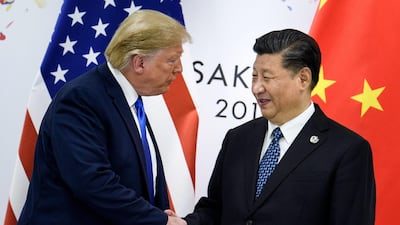The US and China agreed to a "phase one" trade deal, temporarily freezing their tariff war and prompting the biggest rally in oil prices in three months.
The preliminary trade deal puts a planned 15 per cent levy on $160 billion (Dh587bn) worth of Chinese goods due to be implemented on December 15 on hold. Mobile phones, laptops, clothing and toys would have been affected if the duties had been introduced. The US will also reduce by half the levy rate it imposed on $120bn of Chinese goods in September to 7.5 per cent.
In exchange, China agreed to drop a 25 per cent levy that was to take effect on December 15 on US cars. China will also buy annually up to $50bn of US agricultural products, energy and other goods and Beijing pledged to address American grievances regarding intellectual property right practices.
"We have agreed to a very large Phase One Deal with China. They have agreed to many structural changes and massive purchases of Agricultural Product, Energy, and Manufactured Goods, plus much more. The 25 per cent Tariffs will remain as is, with 7 1/2 put on much of the remainder...," the US President Donald Trump tweeted on Friday. The two sides will begin work on a "phase two" deal immediately, with no plans to delay another agreement until after the 2020 US presidential election, he added.
China has committed to refrain from currency devaluations that give it a trade advantage, which if violated will incur US retaliatory tariffs.
Oil prices, which have been largely in tepid territory this year due to the trade dispute surged to above $65 per barrel for the first time since the September attacks on Saudi Arabia's oil processing facilities, which temporarily halted 5 per cent of global supply.
Brent settled at $65.22 per barrel on Friday, while West Texas Intermediate closed at $60.07 per barrel. The S&P 500 also closed at a record high of 0.9 per cent on Friday.
The tariff discord between the world's largest economies placed brakes on global economic growth this year, as well as curtailed demand growth for crude.
"Rolling back tariffs in exchange for buying more agricultural products doesn’t fix any of the big trade issues. From a markets standpoint a phase one deal would just improve the chance of a global economic rebound next year," said Jasper Lawler, head of research at trading company London Capital Group.
The International Monetary Fund in October cited increased protectionism as well as uncertainty relating to trade and geopolitics behind what it called a "synchronised slowdown" in global economic growth. The multilateral lender projected the world economy to grow 3 per cent this year, a 0.3 percentage point downgrade from its April forecast, as well as its fifth outlook revision for 2019. Economic growth averaged 3.6 per cent last year. The global economy is forecast to pick up to 3.4 per cent in 2020, a 0.2 percentage point reduction from an earlier forecast.
"There’s arguably not much of a 'big deal' here to alleviate long-term US-China trade policy uncertainty given this is a deal that eschews any of the core issues," said Bethel Loh a strategist with ThinkMarkets. "It’s also a deal that fails to be translated and written down meaning enforcement and follow-through could be found lacking going into 2020. Ultimately, China seems to have outmanoeuvred the US as Trump looks to control the narrative and protect his S&P 500 collateral ahead of the fast approaching US presidential election race."


